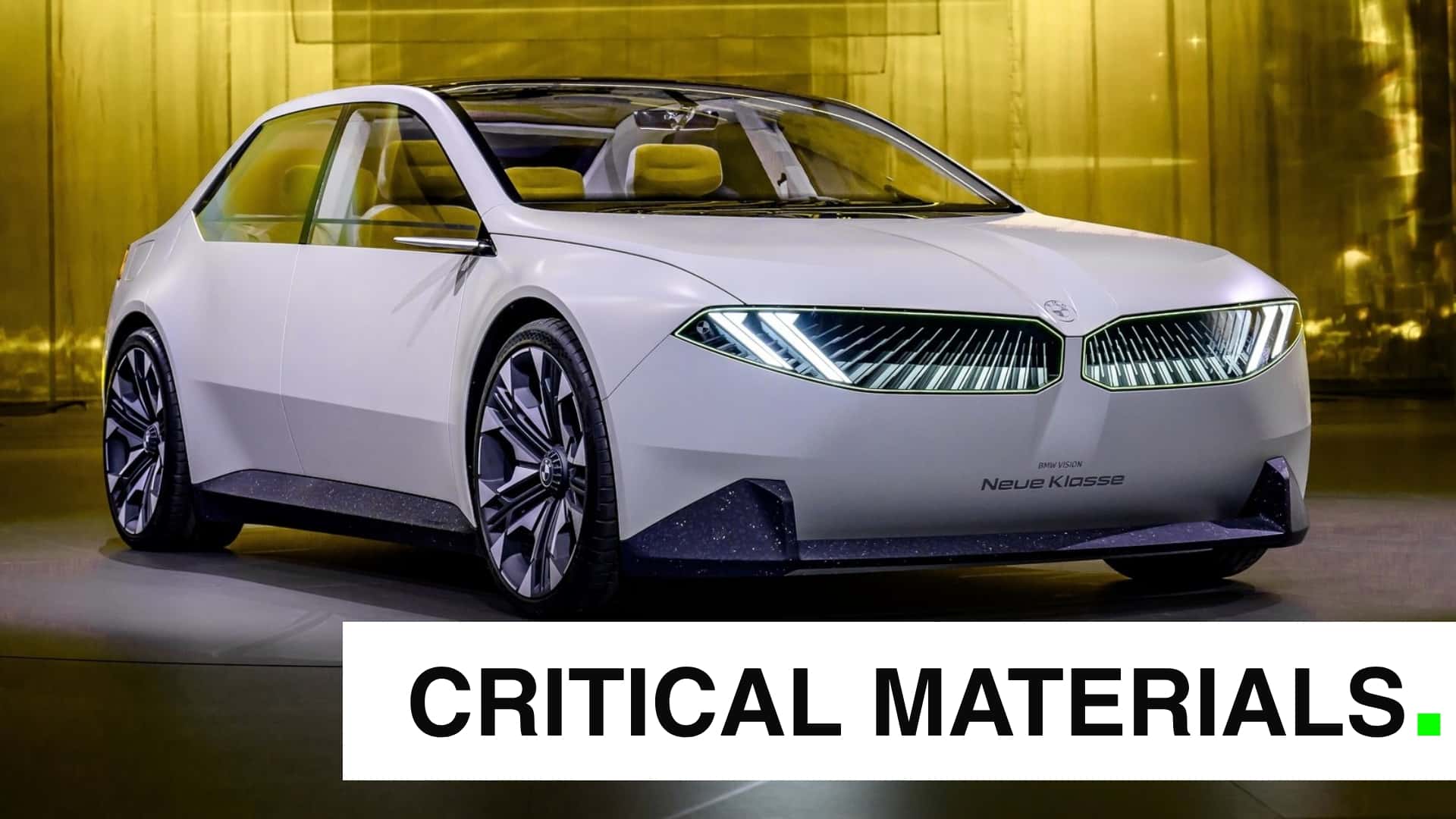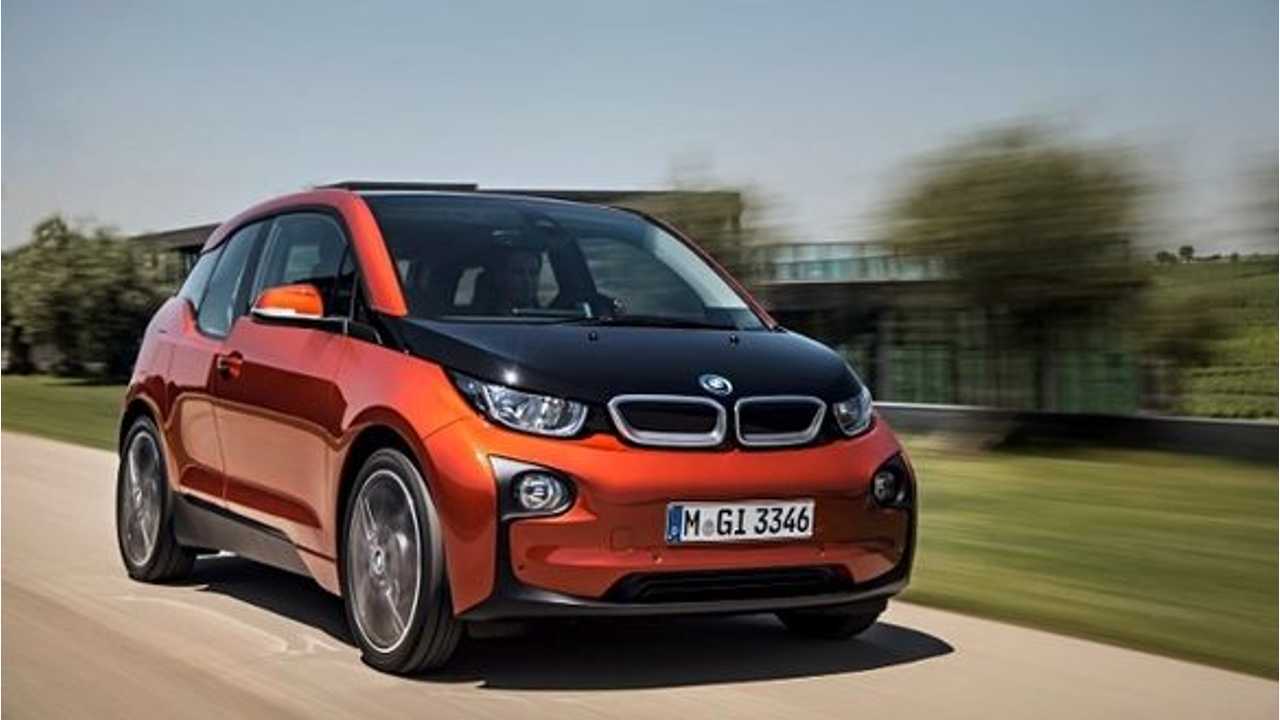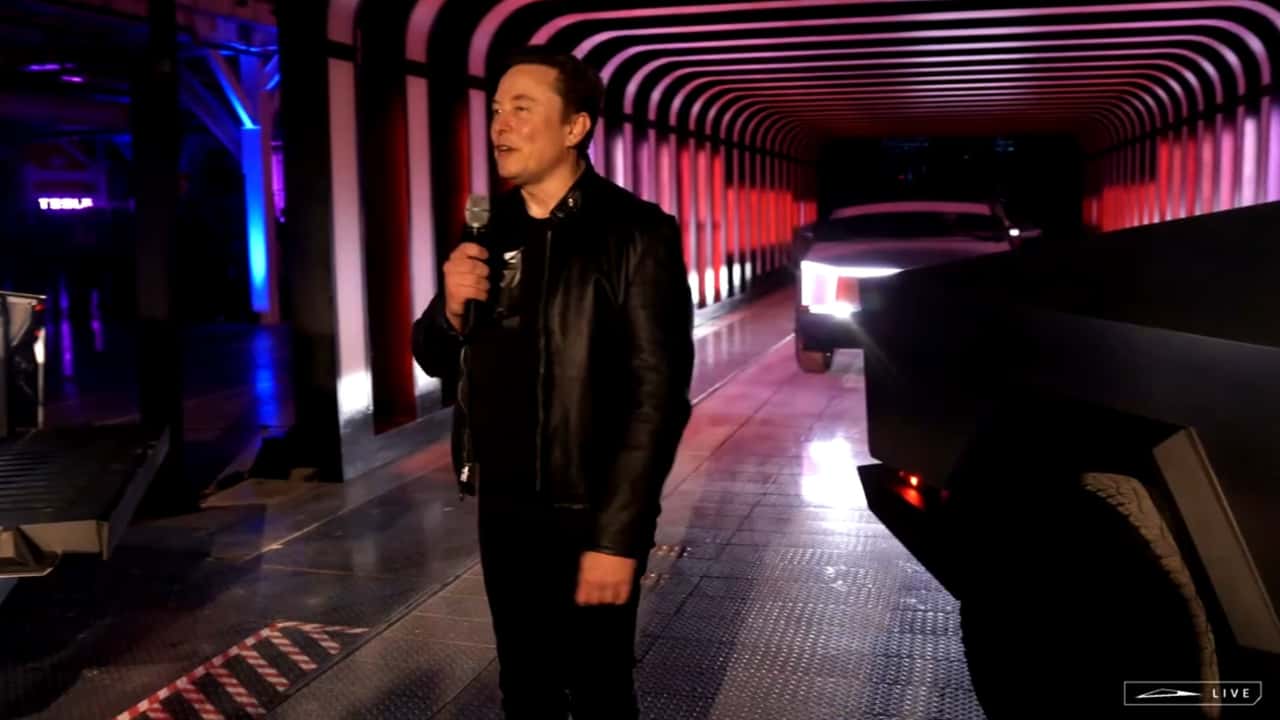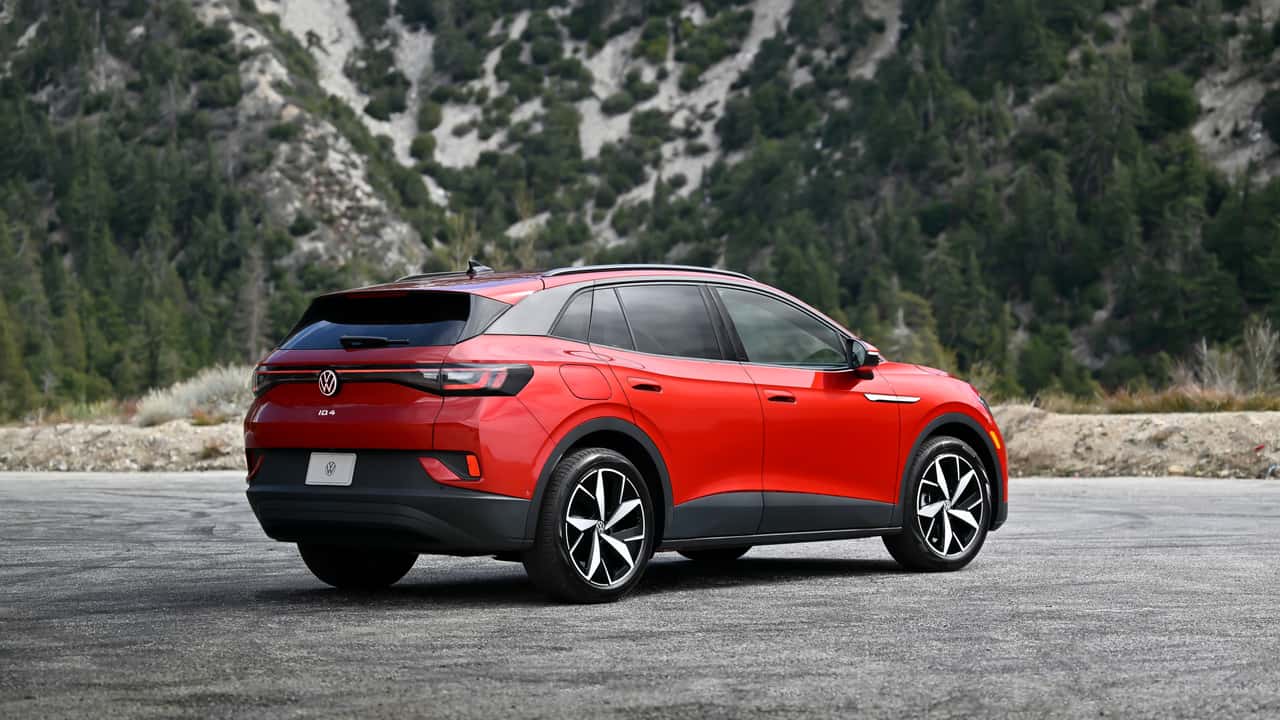
bmw neue klasse critical materials
We look at BMW’s stealth success in the EV realm, as well as the pressure on Tesla and a crucial UAW vote in the American South this week.
You know you’re doing well in the EV game when even the New York Times starts to notice. Though it’s a smaller company than direct competitors like the Mercedes-Benz Group and the Volkswagen Group, BMW’s new crop of electrics got rave reviews and now makes up an enviable portion of overall sales. But how did that happen?
We find out on today’s midweek edition of Critical Materials, and we hear more about the state of things at Tesla and check in on the crucial United Auto Workers unionization vote at Volkswagen’s ID.4 factory in Tennessee.
30%: How BMW Got Its Electric Groove Back

USA Today Says BMW i3 Stands Out in 5 Ways (w/video)
If you’ve been at this a while, like I have, you remember the early part of the last decade when BMW came out swinging with the compact electric and plug-in hybrid i3 city car and the hybrid i8 sports car. (Which, I maintain to this day, still looks amazing and was supremely underrated to actually drive.) Then, after BMW put those two out… nothing. Not for years, really.
Inside the company, there was a lot of hand-wringing over what the “i” sub-brand should even be or do. EVs? Hybrids? Autonomous cars? And while the i3 was popular in many places and still happily driven today, let’s just say it wasn’t exactly the Tesla Model 3 in terms of sales figures.
Today, Bloomberg explains the lessons learned from BMW i 1.0:
In 2008, BMW engineers set out to develop an electric city car from scratch. Five years later, the company introduced the i3, a quirky four-seater with rear-hinged back doors and a frame made with carbon fiber. The car looked unlike anything else in its portfolio, but with its steep sticker price and limited range, sales were muted. Disillusioned, BMW slowed its EV plans.
Years spent soul-searching led to criticism that BMW was stalling on EVs. Lately, though, the company has been hitting the right notes with a much less radical approach. It designed EVs almost indistinguishable from their combustion engine-powered siblings, and is building them on the same factory line to contain costs.
The approach is paying dividends: BMW shipped more than twice as many EVs than Audi in the first quarter, and roughly two-thirds more than Mercedes-Benz Group AG.
And guess what? All that knowledge from the i3 paid off nicely later on:
“BMW has been able to adapt its over one decade worth of battery-electric vehicle knowledge into its current model lineup with almost zero handicap,” said Matthias Schmidt, an independent auto analyst near Hamburg. “They have carried the Ultimate Driving Machine mantra over to their EVs.”
[…] Chief Executive Officer Oliver Zipse has made some decisions that currently are giving the Munich-based automaker a leg up. Instead of investing billions in its own battery factories, BMW is sourcing cells from external suppliers including China’s CATL, allowing the carmaker to respond flexibly to swings in demand. Its work on autonomous-driving technology and in-car software catered to Chinese customers bolstered its technology credentials in the biggest auto market, Skirta said.
BMW is also notable because it’s not openly committing to an end date for internal combustion. But it is making serious moves in that direction, like ending ICE production at its oldest hometown factory. Meanwhile, it offers a mix of ICE, hybrid and EV options across its whole lineup, and that “have whatever you want” approach really seems to be working with customers—perhaps since they don’t feel “forced” into electrification.
What’s next for BMW is the Neue Klasse platform, its first truly ground-up effort since the i3 days. That seems promising so far for the Ultimate Driving Machine’s zero-emission future.
60%: The Heat Was On At Tesla Before The Layoffs

Tesla Cybertruck Delivery Event (2023)
Next Tuesday, investors, analysts and fans are going to expect some serious answers at Tesla’s Q1 earnings call, especially after slumping sales numbers, massive layoffs and a pivot to autonomous driving that feels rather suspect. (In my experience, answers will be few and far between; we may all be waiting for the “robotaxi” event on August 8.)
But mass layoffs mean a lot of disgruntled sources talking to journalists, even if their former boss is as litigious as Elon Musk is. Today, The Information (subscription required) dishes on the state of things at Tesla before the cuts came down.
In particular, the departure of longtime powertrain and energy chief Drew Baglino was a shock, but here’s what The Information hears:
While some employees were told not to worry about layoffs, they saw some concerning signs. Major projects run by Baglino faced issues in recent months, two of the people said. Baglino oversaw planning for a factory that will make cathodes, a component of the batteries that go inside Tesla’s vehicles, which had fallen behind schedule, the former employees said. The leader of that project, Anthony Thurston, was also laid off, he announced on Monday.
A second project led by Baglino—to redesign the battery pack for Tesla’s Model Y—fell apart in late 2023. Tesla decommissioned the assembly line that produced the part, known as a structural battery pack, in December and has started to dismantle the line to use the parts on other projects, one of the former employees said.
The mood was apparently tense in Austin last week too, in part because of delays to the “Dojo” supercomputer seen as key to autonomous driving:
Another hitch in the construction: The ground floor couldn’t be laid until The Boring Company, Musk’s tunneling startup, completed a subterranean road under the structure, which Tesla hopes its pickup trucks—the Cybertruck—will one day use to autonomously ferry themselves to another part of the sprawling campus, one of the people said. In response to the delays, Musk fired Amir Mirshahi, the construction project’s director of infrastructure, said the two former employees, who had been briefed on his departure.
We’ll see what Musk and co. say next week, I suppose.
90%: Union Vote Starts At Volkswagen’s ID.4 Plant

2024 Volkswagen ID.4
I would argue that the unionization vote at Volkswagen’s Chattanooga, Tennessee plant this week is an even bigger deal than the UAW’s strike on and landmark contract with the Big Three last year. That was indeed historic, but the UAW is used to dealing with Ford, General Motors and Stellantis.
Now, it’s trying to unionize a so-called “foreign” U.S. plant, something it’s failed at for decades. The Chattanooga plant makes a variety of cars, sure, but it also makes the ID.4 sold in the U.S.; some of this will have downstream effects on how much future EVs in America will be union-made or not.
From the Detroit Free Press today:
The polls opened at 4:45 a.m. Wednesday. The secret-ballot voting, which takes place inside the plant and is run by the National Labor Relations Board, goes until 8 p.m. Friday, with results expected later that night, according to the NLRB and a Volkswagen spokesman.
Labor experts say if the UAW wins at VW Chattanooga, it will be a historic and hard-won victory, after repeated failures over the past decade to organize foreign automaker plants in the South.
For one thing, it would add thousands of members to the UAW. UAW membership is far below its 1979 peak of 1.5 million. The union currently counts almost 400,000 active members and 580,000 retired members.
“This is a defining moment for the UAW. A victory really sets a precedent and breaks the glass ceiling that you can’t organize auto factories in the South,” said Harley Shaiken, a labor expert and professor emeritus at the University of California-Berkeley. “A victory doesn’t automatically translate into a victory at other nonunion automakers, but it sets the standard and the momentum. So victory is a huge gain.”
Already, six governors in carmaking southern states—Alabama, Georgia, Mississippi, South Carolina, Tennessee and Texas—have stepped up to oppose the drive. Again, all of those places make or will make, EVs, so one way or another, this will be far from over. But this week’s vote will say a lot.
100%: What Do You Want To Hear At Tesla’s Q1 Call Next Week?
Again, I’m not optimistic we’ll learn much. But what would you ask if you got called on there?
Contact the author: [email protected]
More EV News
-
AWS and Clarity AI to use generative AI to boost sustainable investments
-
Ref Watch: 'Enough' of a foul to disallow Man City goal vs Liverpool
-
Day in the Life: Ex-England rugby star on organising this year's Emirates Dubai Sevens
-
Pandya returns to MI, Green goes to RCB
-
Snowstorm kills eight in Ukraine and Moldova, hundreds of towns lose power
-
‘This is why fewer Sikhs visiting gurdwaras abroad’: BJP after Indian envoy heckled in Long Island
-
Inside a Dubai home with upcycled furniture and zero waste
-
Captain Turner aims for Pitch 1 return as JESS bid to retain Dubai Sevens U19 crown
-
No Antoine Dupont but Dubai still set to launch new era for sevens
-
Why ESG investors are concerned about AI
-
Your campsite can harm the environment
-
Mubadala, Saudi Fund deals on US radar for potential China angle
-
Abu Dhabi T10 season seven to kick off with thrilling double-header
-
Eight climate fiction, or cli-fi, books to consider before Cop28
